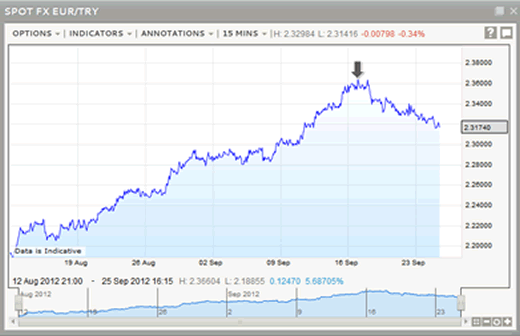Turkey Lira and the Euro
Currencies / Forex Trading Sep 26, 2012 - 11:06 AM GMTBy: Nick_Dockerty
After hitting a low of 2.1725 at the beginning of August the euro has rallied against the Turkish lira in the past few weeks. The euro climbed to 2.3650 on September 17 but as scepticism surrounding the latest eurozone debt solution has re-surfaced among investors it has retreated since with one euro buying 2.3183 on September 25.

As Turkey’s EU membership talks continue the question remains, is Turkey’s economy likely to be stronger inside or outside the EU?
After long years of declining economic health Turkey agreed a tough recovery programme with the IMF in 2002. It’s argued that these tough austerity measures helped Turkey escape the worst of the global recession. Through 2010 and 2011 economic growth in Turkey jumped to around 8.5–9% as its tourism, agriculture and manufacturing sectors boomed.
However 2012 GDP growth in Turkey has stalled somewhat – 2.9% in the second quarter– and recently, its finance minister Mehmet Simsek hinted that Turkey is likely to miss its budget deficit this year.
Unemployment in Turkey fell to a 11-year low of 8% from May to July. The figure is still on the high side though and that coupled with stubbornly high inflation of 8.9% as last measured in August has meant that domestic demand in Turkey remains weak as evidenced by its latest import figures which showed a fall of 1.5% in July.
Its latest export figures suggest that demand from the EU–Turkey’s largest trading partner– is declining overall with exports to the EU dropping by 3% to €24 billion in the first half of 2012 compared with the same period a year earlier. However, lower labour and production costs have made Turkish white goods more attractive to cash-strapped European consumers and exports of them are expected to rise by a significant 15% in 2012.
Looking east, Turkey exported a massive $8 billion worth of goods to Iran in the first seven months of 2012 compared with $2 billion a year earlier. And while the vast majority of this is down to gold exports it serves to highlight the strong strategic trade position Turkey is in as it strives to maintain healthy political relationships with the major economic powerhouses in Europe and Asia.
So, was the 2010/2011 upturn just a bubble making Turkey’s move toward EU membership a necessity or is the recent slowdown just temporary and membership of the EU an unnecessary burden?
Nick Dockerty is a financial writer and researcher for IG Markets, a leading CFD provider. The above comments do not constitute investment advice and IG Markets accepts no responsibility for any use that may be made of them. Visit http://www.igmarkets.co.uk/
© 2012 Copyright Nick Dockerty – All Rights Reserved
Disclaimer: The above is a matter of opinion provided for general information purposes only and is not intended as investment advice. Information and analysis above are derived from sources and utilising methods believed to be reliable, but we cannot accept responsibility for any losses you may incur as a result of this analysis. Individuals should consult with their personal financial advisors.
© 2005-2022 http://www.MarketOracle.co.uk - The Market Oracle is a FREE Daily Financial Markets Analysis & Forecasting online publication.



